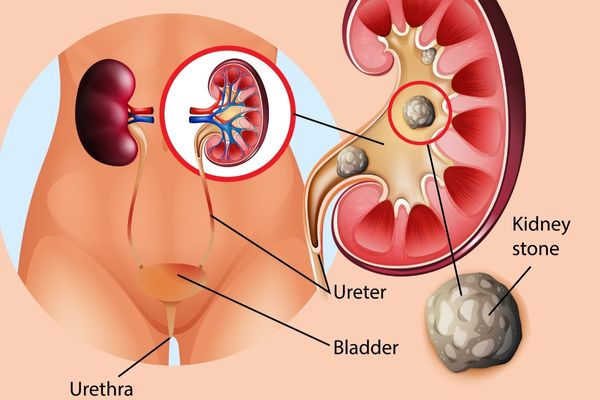Kidney Stone Treatment in Turkey
Kidney Stone Treatment at Vitale Hospital


What are Kidney Stones?
Kidney stones are hard mineral and salt deposits that form inside the kidneys, ranging in size from tiny grains to larger stones that can obstruct the urinary tract. These stones develop when urine becomes concentrated, allowing minerals and salts to crystallize and stick together, ultimately forming solid masses. Kidney stones can vary in composition, with common types including calcium oxalate, uric acid, struvite, and cystine stones, each with specific contributing factors and treatments.
Table of Contents
ToggleKidney stones can cause significant discomfort as they move through the urinary system. Small stones may pass unnoticed, but larger stones can become lodged, causing sharp pain, bleeding, or urinary blockages. Left untreated, kidney stones can lead to serious complications, such as kidney infection, chronic kidney disease, or reduced kidney function. Early diagnosis and treatment are essential to prevent these issues and manage symptoms effectively.
What Causes Kidney Stones?
The formation of kidney stones is influenced by a combination of dietary, genetic, and lifestyle factors. Here are the main contributors:
- Dehydration: Not drinking enough water is a significant risk factor, as it increases urine concentration and promotes the crystallization of minerals that form stones. Inadequate hydration causes the kidneys to filter more minerals with less liquid, allowing stones to form.
- Dietary Choices: Consuming a diet high in sodium, protein, and oxalate-rich foods (like spinach, nuts, and chocolate) can contribute to stone formation. Excess salt increases calcium in the urine, while high oxalate and protein levels can lead to specific types of stones.
- Genetics and Family History: A family history of kidney stones increases the likelihood of developing them, as genetic factors can influence kidney function and the tendency to accumulate certain minerals in the urine.
- Medical Conditions: Conditions like obesity, diabetes, gout, and urinary tract infections can elevate the risk of kidney stones. For example, obesity can alter urine composition, and diabetes can increase urine acid levels, both of which contribute to stone formation.
- Medications and Supplements: Certain medications, such as diuretics and calcium-based antacids, can increase the risk of kidney stones. High doses of vitamin C and calcium supplements may also contribute to stone development.
Symptoms of Kidney Stones
The symptoms of kidney stones vary based on the size, type, and location of the stone. While some kidney stones may pass unnoticed, larger stones often lead to significant discomfort. Here are common symptoms:
This is typically experienced in the back, side, or lower abdomen and may radiate towards the groin. Pain often comes in waves as the stone moves through the urinary tract.
Patients often experience a burning sensation or sharp pain when urinating, especially if the stone has moved into the ureter or is close to the bladder.
Blood may be visible in the urine as a pink, red, or brown discoloration, or detected only through a lab test.
This is common when the stone is near the bladder, making patients feel an intense need to urinate frequently.
These symptoms can occur due to severe pain or if the kidney stone causes a blockage, affecting kidney function.
Where is Kidney Stone Pain Located?
Kidney stone pain, also known as renal colic, typically starts in the lower back or side, just below the ribs, as the stone moves from the kidney toward the bladder. This pain can be intense and often shifts in location as the stone travels through the urinary tract, sometimes radiating to the lower abdomen and groin.
The pain associated with kidney stones is often described as severe and comes in waves, fluctuating as the stone changes position. Additionally, patients may experience pain or a burning sensation during urination, especially if the stone is close to the bladder or urethra.
How are Kidney Stones Treated in Turkey?
Kidney stone treatment in Turkey involves various methods, chosen based on the size, type, and position of the stone as well as the patient’s overall health. Here are the common treatment options available:
Pre- and Post-Operative Care for Kidney Stone Treatment in Turkey
Before Treatment:
- Patients may need to stop taking blood thinners or other medications that increase bleeding risk, as directed by their doctor.
- Proper hydration is encouraged, as it helps keep urine diluted and flushes the urinary system.
- Sharing medical history, including any known allergies or conditions, helps the medical team prepare the best care plan.
After Treatment:
- Staying hydrated is essential for flushing out any stone fragments and preventing future stones.
- Periodic imaging and urine tests help monitor recovery and detect any remaining fragments or potential new stones.
- Patients may be advised to avoid certain foods high in oxalates, sodium, or protein to reduce the risk of stone recurrence.
Doctors
Op. Dr. Kemal BULUT
Urology Specialist

Cost of Kidney Stone Treatment in Turkey 2025
The cost of kidney stone treatment in Turkey depends on factors like the type of procedure, and the specialist’s expertise. Turkey offers competitive pricing for international patients, often with all-inclusive packages that cover:
- Initial consultations and diagnostic tests (e.g., imaging and urine analysis).
- Procedure costs, including surgical or minimally invasive treatments.
- Follow-up care and any additional tests needed after the procedure.
By choosing Turkey for kidney stone treatment, patients benefit from high-quality medical care, advanced technology, and skilled specialists at a cost-effective rate. This combination makes Turkey an attractive destination for kidney stone treatment, providing effective solutions for long-term relief and recovery.
FAQ
The most effective treatment depends on the size and location of the stone, with options like Extracorporeal Shock Wave Lithotripsy (ESWL) for smaller stones and Percutaneous Nephrolithotomy (PCNL) for larger ones. Consulting with a specialist can determine the best approach tailored to the patient's needs.
The best method varies based on the stone's size and position; ESWL is preferred for smaller stones, while ureteroscopy and PCNL are ideal for larger or harder-to-reach stones. Each method has unique benefits, so a personalized evaluation ensures optimal results.
While kidney stones can be effectively removed, recurrence is possible, especially if preventive measures aren’t taken. Following lifestyle changes, dietary adjustments, and staying hydrated can significantly reduce the risk of new stones forming.
Kidney stone removal procedures are generally safe, but risks vary depending on the method; possible risks include infection, bleeding, or minor discomfort. Consulting with an experienced specialist and following pre- and post-operative care reduces these risks and supports recovery.


